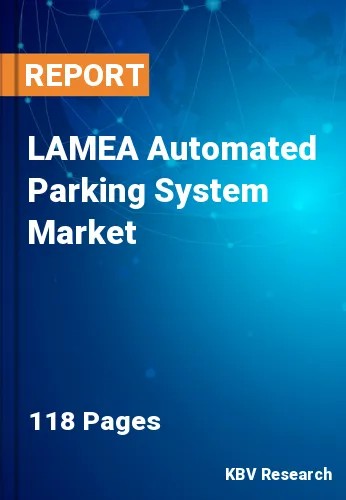The Latin America, Middle East and Africa Automated Parking System Market would witness market growth of 18.7% CAGR during the forecast period (2023-2030).
The trend towards mixed-use developments, combining residential, commercial, and recreational spaces, benefits significantly from automated parking systems. The flexibility of APS allows developers to allocate space judiciously, ensuring that the parking infrastructure complements the diverse functions within the mixed-use complex. Automated parking systems extend their reach to public infrastructure projects, including transportation hubs and transit-oriented developments. Integrating APS with transit hubs facilitates smoother intermodal transitions for commuters.
Furthermore, the demands of commercial and corporate environments, characterized by a continuous influx of visitors and employees, necessitate efficient parking solutions. APS not only optimizes space utilization but also enhances the overall user experience. The seamless integration of automated parking aligns with the modern, tech-driven image that many corporate entities aspire to project. The efficient use of space near transportation nodes becomes critical in reducing congestion and optimizing urban mobility.
Additionally, increasing vehicle numbers in South Africa often leads to traffic congestion, especially in major urban centers like Johannesburg, Cape Town, and Durban. Automated parking systems can contribute to alleviating congestion by reducing the time spent by drivers searching for parking spaces, which is a common contributor to traffic delays. As per the International Trade Administration, light commercial vehicle imports in South Africa constituted 18.1 percent of total light commercial vehicle sales of 133 078 units in 2021, while passenger car imports comprised 78.3 percent of total passenger car sales of 340 340 units in 2021. Hence, a rise in smart city initiatives and vehicle numbers in the LAMEA region will boost the demand for automated parking systems.
The Brazil market dominated the LAMEA Automated Parking System Market by Country in 2022, and would continue to be a dominant market till 2030; thereby, achieving a market value of $140.4 million by 2030. The Argentina market is registering a CAGR of 19.2% during (2023 - 2030). Additionally, The UAE market would showcase a CAGR of 18.3% during (2023 - 2030).
Based on Component, the market is segmented into Hardware and Software. Based on Platform Type, the market is segmented into Palleted and Non-Palleted. Based on Automation Level, the market is segmented into Fully Automated and Semi-Automated. Based on End Use, the market is segmented into Commercial, Residential and Mixed-Use. Based on Structure Type, the market is segmented into Tower System, Puzzle System, Silo System, AGV System, Shuttle System, and Rail Guided Cart (RGC) System. Based on countries, the market is segmented into Brazil, Argentina, UAE, Saudi Arabia, South Africa, Nigeria, and Rest of LAMEA.
Free Valuable Insights: The Worldwide Automated Parking System Market is Projected to reach USD 6.4 Billion by 2030, at a CAGR of 17.4%
The market research report covers the analysis of key stake holders of the market. Key companies profiled in the report include Skyline Parking, Westfalia Technologies, Inc., Unitronics (1989) (R”G) Ltd, KLAUS Multiparking GmbH, Robotic Parking Systems Inc., Park Plus, Inc., WOHR Autoparksysteme GmbH, Parkmatic, and EITO&GLOBAL INC.
By Component
By Platform Type
By Automation Level
By End Use
By Structure Type
By Country
Our team of dedicated experts can provide you with attractive expansion opportunities for your business.

